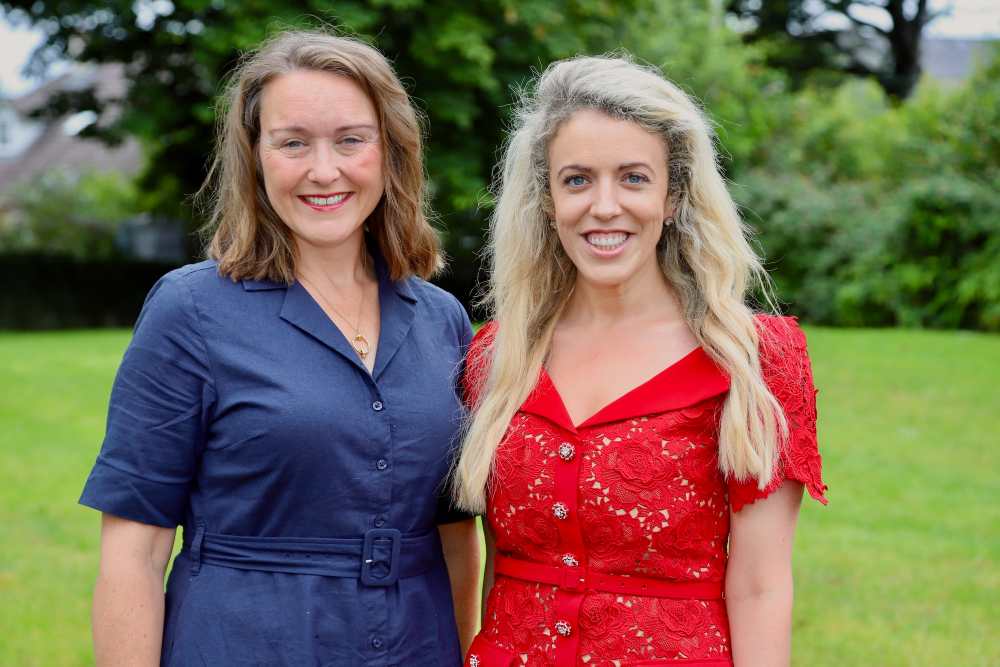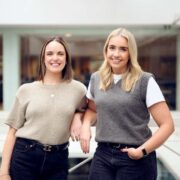Sue Gannon, fractional chief people officer at Platform94 and former VP of HR at Netflix, shares her life and business lessons.
Platform94 recently appointed Sue Gannon as fractional Chief People Officer (CPO), marking a bold new step in its mission to provide world-class, on-demand executive expertise to scaling businesses throughout the west and northwest of Ireland.
Her career includes senior leadership roles at Netflix (VP of HR), Campbell Soup Company (Global Talent Director), Dr. Martens (Chief Human Resources Officer), Beam Suntory (VP of HR & Global Talent, Americas), and Suntory Holdings (Deputy COO, Global HR), with assignments across the US, UK, Japan, Ireland, Australia, and New Zealand.
“I love bringing people together, unlocking potential, and creating environments where individuals and organisations can do their best work”
Through her new role as Platform94’s Fractional CPO, Sue will work independently with organisations across the region to deliver strategic HR leadership and advice. Working with executives teams; Sue’s role will be to help leaders build scalable organisational structures, think strategically about talent and shape their high performance cultures. From long-term strategic planning to targeted project delivery, Sue’s approach is pragmatic, collaborative, and results driven.
Tell us about your background, what journey did you take to arrive at where you are?
My early career was a little mixed as I figured out my direction after university. I had studied Arts and moved to London, where I worked in HR at the BBC. After five years of travelling and working overseas, I returned to Australia and walked into a recruitment agency, asking to be placed in any HR role available. That landed me at the Commonwealth Bank, one of Australia’s largest retail banks, where I spent the first three years building my HR foundation, whilst studying HR at technical college.
From there, I steadily worked my way up the HR ladder. I developed an early interest in leadership development and talent progression, which has shaped at least half of my career in organisational effectiveness and talent development. At the same time, I was ambitious about reaching the Chief People Officer seat, so I gained deep experience in HR business partnering and executive leadership roles.
“What sets me apart is my ability to work side by side with CEOs and leadership teams to translate big strategies into practical actions that build stronger cultures, higher-performing teams, and sustainable business results through and with people”
International travel was always important to me, and hence I’ve had a very international career. At Campbell Soup Company, I was relocated to the US, beginning a nine-year international career that spanned Philadelphia, Chicago, and Los Angeles—and nearly every state in between. When the company I joined in Chicago was acquired by a Japanese multinational, I spent three years in Tokyo, further broadening my perspective.
I relocated to Los Angeles in 2020 and joined Netflix for 18 months before being headhunted by Dr. Martens to take on the Chief People Officer role. The company had just listed on the UK stock exchange, making it an exciting opportunity, though it came early in my Netflix journey. After almost 2 years as the head of HR, I made the decision to return closer to home and establish my own consulting business in Ireland.
The first few years of running my consultancy were both rewarding and challenging. Partnering with Platform94 has been a turning point—sharpening my positioning, strengthening my network, and creating real momentum. I am now in an excellent place to grow and scale my HR consulting and services business.
Why are you doing what you are doing? What need are you meeting? What’s your USP?
My relationship with HR has been one of two halves. For the first 20+ years of my career, I loved the function – I believed we were doing important, valued work: creating the talent of the future, shaping the next generation of leaders, and helping organisations be more effective and productive. In the later years of my corporate career, I realised I could have a greater impact from the outside, bringing an objective and non-biased perspective to organisations seeking change, transformation, and growth.
“One of my most important hiring rules is to look for ‘additive talent’ rather than just hiring for ‘fit’”
Since starting my consulting and coaching business, I’ve seen the difference that external clarity and judgment-free advice can make. My USP is exactly that: combining two decades of global experience across some of the best – and most challenging – companies with an outsider’s perspective, to help leaders and teams operate at their very best in service of their people, their customers, and their industry.
How did you fund and start the business and what are your growth plans?
I’m in a fortunate position that as an individual consultant there are limited financial investments required to get started. That’s not to say there are none, but not as significant as there are in manufacturing or technology products. I was fortunate to have a few retainer clients at the start, which funded my limited start-up costs in the first financial year. I am hoping to meet my small revenue targets in this first year which are in the building stages of my business, and then accelerate next year to double the financial revenue of my business.
What are your key skills and qualities that set you apart?
I’m a people-focused HR leader, team and leadership coach and development facilitator. What sets me apart is my ability to work side by side with CEOs and leadership teams to translate big strategies into practical actions that build stronger cultures, higher-performing teams, and sustainable business results through and with people. I bring a mix of global perspective, commercial insight, and a passion for leadership development, using both proven and innovative approaches like coaching, neuroscience, and team facilitation. At my core, I love bringing people together, unlocking potential, and creating environments where individuals and organisations can do their best work.
What (or whom) has helped you most along the way? Who was your greatest mentor/inspiration?
It’s all “whom” for me. I’ve been so very fortunate in my career to work with some brilliant leaders who have been role models, sponsors and mentors throughout my career – many who have gone on to write top selling books about exceptional leadership – Mindy Mackenzie, Doug Conant, Makiko Ono and Lynne Weedall. But I think the greatest help I’ve had along the way is from the people I’ve worked with and have had the privilege to lead – Dorothy Hammond, Henry Sandbach, Rob Green, Sophia Tsai, Vanessa Panayi – far too many to mention.
What was the greatest piece of business advice you ever received?
- When it comes to hiring people: “When in doubt… don’t.”
- When it comes to leading people: “People will forget what you said, people will forget what you did, but people will never forget how you made them feel.”
- And when it comes to all things: “Listen to your intuition, for it is the deepest and most powerful source of wisdom and truth.”
What circumstances/qualities/events can mark the difference between success or failure in life or business?
Most solopreneurs I talk with will say the greatest qualities of success are grit, perseverance and persistence to stick with it in those first few years, and during the tougher times when the results are more elusive or take more time.
What was the most challenging aspect of either starting or growing the business?
In corporate life I had the benefit and security of a consistent pay cheque. That provides a degree of peace of mind that simply doesn’t exist when you’re starting a business and working for yourself. Particularly at the start. The most challenging aspect of the start-up phase is the time it takes to build the business, particularly in the first one to two years. I didn’t have any experience in business development, therefore I needed to learn a completely new skill set to build my network and client base, whilst remaining patient and understanding that all good things take time.
Partnering with Platform94 has been an exceptional opportunity to build out my network, and provide me with a platform and brand to connect with start-up and scaling technology companies in the west of Ireland – these types of opportunities are game changers for a growing business!
If you were to do it all over again, what would you do differently?
During my corporate life I simply didn’t value the importance and value of networking. The watering and feeding of that network on a regular basis. I just didn’t see the benefit.
So if I were to turn back time, whilst having the security of a regular income I would have built, nurtured and spent a considerable more time investing in my relationships outside the business. This would have allowed me to service the business with different perspectives, and to be in a position to transition more seamlessly between corporate and solopreneurship.
Who inspires you in business today?
Sue Gannon and Marie Donnelly, Platform94
The people that inspire me most are those that seem to have endless and boundless energy, and use it for the benefit of others. A great example is Marie Donnellan at Platform94 – she is simply exceptional and I’m very grateful to be in her orbit.
Other women that inspire me are those who seamlessly integrate their life priorities, values and business – they make this boundary setting and integration look easy, but I also know the truth – it’s simply not! Claire Scanlan (Educate360), Áine Kennedy (Smooth Company), Caroline Hughes (Conscious Leaders), and Sarah Langley (Beam Spirits) are some examples of who inspires me.
What advice/guidance do you give new hires and how do you nurture talent in your organisation?
One of my most important hiring rules is to look for “additive talent” rather than just hiring for “fit.” The best hires are people who bring different perspectives, experiences, and backgrounds – those who complement, not duplicate, what already exists. Once you’ve selected that talent, the real work is making sure they’re set up for success: a clear onboarding plan, guidance on how to learn the business, clarity on which relationships matter, and alignment on how they’ll work with you as their leader.
I always set clear expectations for the first 90 days and then establish focused objectives for the first 12 months –because the most basic thing every employee needs is to know what’s expected of them. And for new hires, I always recommend reading The First 90 Days by Michael Watkins—it’s an essential guide for making an impact in your first year.
What business books do you read or would recommend?
I’m an avid reader and I’ve been inspired by the greats – all for different reasons. Brene Brown, Patrick Lenzioni, Erin Meyers, Marshall Goldsmith, Stephen Covey and Victor Frankl to name a few. The three books that have been most impactful to my leadership development are – 5 Dysfunctions of a Team, Dare to Lead and Leaders Eat Last. Oh, and everyone should read Man’s Search for Meaning and The Alchemist of course.
What social media platforms do you prefer and why?
LinkedIn and Instagram are my go-to platforms. I use LinkedIn to build credibility and connect with potential clients and my broader network, and Instagram showcases my brand’s personality and visually engages with my potential client and audience.
What are your thoughts on where technology overall is heading and how it will apply to business generally and your business particularly?
Technology, and AI in particular, is moving fast and will have a significant impact on workforce composition, talent planning and organisation design. It’s unlikely to completely make roles redundant, but it will reshape how work gets done and how functions operate. For HR, especially operational HR, this means AI will increasingly take on repetitive, process-heavy tasks, freeing up the function to focus on more value-adding work. The opportunity is for HR to build capability in how to use AI effectively, and to help people see it as a partner rather than a threat. Smart organisations are already creating roles like Chief AI Strategist and seeking talent that can work with AI, not against it – and HR should be right at the centre of that shift.
Finally, if you had advice for your 21-year-old self – knowing what you know now – what would it be?
I wouldn’t tell my 21-year-old self to do anything differently—every job, role, international move, and business decision has shaped who I am today, and I’m proud of that.
But if I were to offer advice, it would be two things:
- First, focus on learning experiences that align with what you love and care about, and that help you become the very best version of yourself.
- Second, nurture your network—stay connected with the people who have supported and impacted you, thank them often, and make sure they know the difference they’ve made. Prioritising those relationships and honouring the people who invest in you will carry you further than you realise.
-
Bank of Ireland is welcoming new customers every day – funding investments, working capital and expansions across multiple sectors. To learn more, click here
-
For support in challenging times, click here
-
Listen to the ThinkBusiness Podcast for business insights and inspiration. All episodes are here. You can also listen to the Podcast on:
-
Spotify
-
SoundCloud
-
Apple







